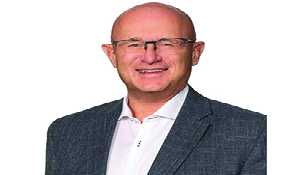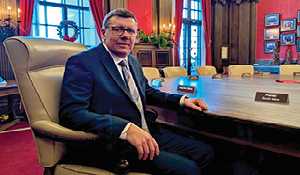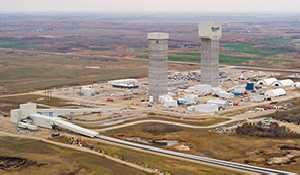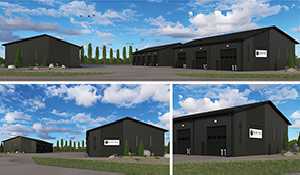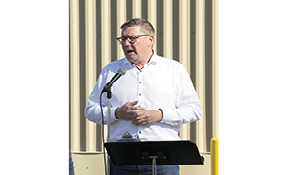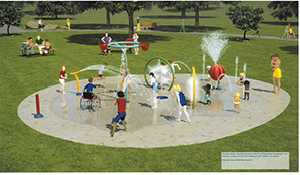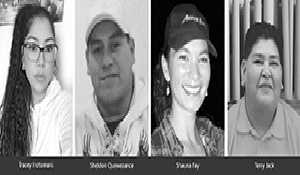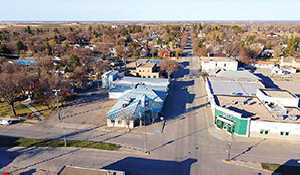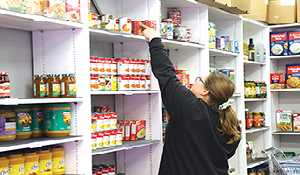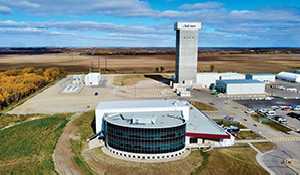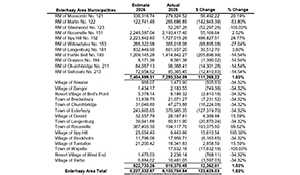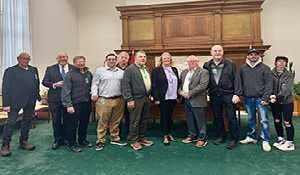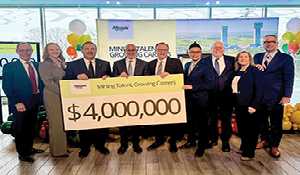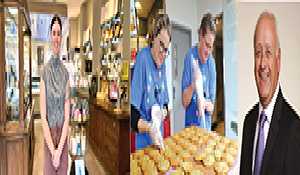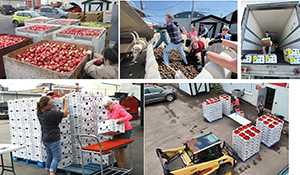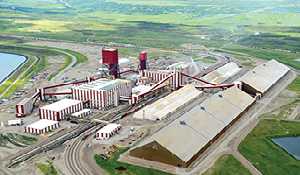Kristjan Hebert: Local farmer to tell agriculture’s story to the world at COP28
December 6, 2023, 10:36 am
Kevin Weedmark
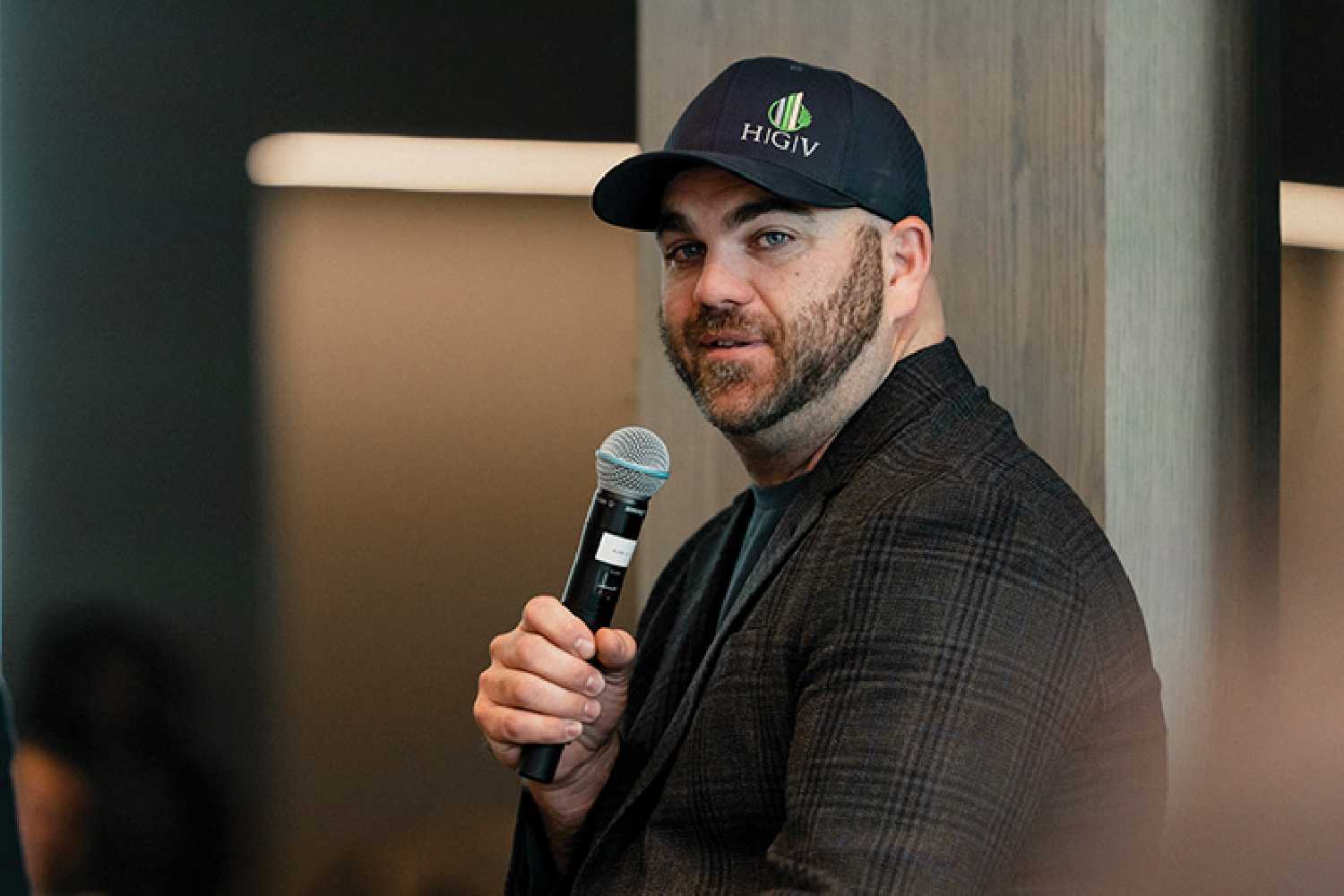

Kristjan Hebert, President of the Hebert Group, will head to COP28 in Dubai next week because he wants to let the world know that agriculture can be part of the solution to climate change, not the villain.
Hebert, who operates a grain and oilseed operation in southeast Saskatchewan, will speak on a number of different panels highlighting the work that’s being done, some of it on his own farm, to help Canada’s ag industry on its path to net zero.
The UN’s Climate change conference aims to bring together leaders from government, business, NGOs and social organizations to help find concrete solutions to the pressing issue of climate change.
Hebert was invited by Premier Scott Moe to be part of the 40-member Saskatchewan delegation which includes several resource-based industries such as agriculture, mining, energy and forestry. He says his goal is to promote both Saskatchewan and Canada’s agriculture industry as a whole.
Hebert Grain Ventures is one of 52 Saskatchewan organizations and companies that will be part of the Saskatchewan Pavilion at COP28. Others include the Saskatchewan Chamber of Commerce, Nutrien, Mosaic and the Canada Alliance for Net-Zero Agriculture (CANZA), among many others.
“It is such a critical time for Canada’s agriculture industry, I couldn’t sit back and watch these discussions happen from afar. Canada’s farmers need a voice; we grow healthy, low-carbon crops for the world. We also sequester carbon in the soil and are a big part of the solution, yet that never seems to be the story we hear coming out of these meetings,” says Hebert.
Canada’s agriculture industry is being called upon to increase food production while, at the same time, making progress towards net-zero targets. Hebert says agriculture and agri-food industries have the opportunity to be at the centre of this movement while helping Canada achieve its 2030 and 2050 climate targets.
The collaborative efforts of government, business, academics and farmers are moving this research in the right direction. Hebert’s farm is part of the Canadian Alliance for Net Zero Agrifood (CANZA), a pilot project underway to study and design a Measurement, Reporting and Verification (MRV) framework to help farmers get paid for carbon they sequester. CANZA will be announced at COP28 on December 10 with representatives from Canada’s Smart Prosperity Institute and Royal Bank.
Another key theme for Hebert is the economic viability of sustainability efforts and technologies.
As an accountant and agricultural finance expert, Hebert is well aware of the associated costs of implementing new practices and scaling them across many acres.
“We can’t go green if we’re in the red,” he says. “Our challenge is to keep pushing forward towards a net zero carbon economy, but it needs to make economic sense. We can’t crater the industry in the process.”
In addition to events with CANZA and the Saskatchewan delegation, Hebert will also participate in events as a representative of the Global Farmer Network, of which he is a lifetime member.
Knowledge sharing with other farmers from more vulnerable countries will be crucial to helping the world achieve fewer emissions.
“There are farmers in Africa and India who still don’t know about the benefits of low till practices. The onus is on us to share our knowledge and teach others about what we’ve learned and help them along this journey,” he says.
Here are the panels Hebert will be participating on:
• Dec. 6 - CANZA - Sustainable Agriculture for the Americas Pavilion
• Dec. 8 - CropLife International - “Working together to improve climate resilience on farm” - Sustainable Agriculture for the Americas Pavilion
• Dec. 9 - Saskatchewan Agriculture: Sustainable Food Production - SK Pavilion
• December 10 - Climate Smart Farming, CANZA Announcement - SK Pavilion
Editor Kevin Weedmark spoke with Hebert about COP28. The full interview follows:
Tell me first of all how this came about? How did you get selected to be a part of the Saskatchewan delegation?
I think part of it was that our farm got chosen to be the first pilot project for CANZA which is Canadian Alliance for Net-Zero Agri-food, so I’ve been doing some collaboration with the U of S, RBC Royal Bank, Loblaw Companies Limited, McCain Foods, Maple Leaf, and Nutrien on a project there, which then led down the path of COP28. I’ve been in lots of discussions with the Saskatchewan government and specifically the Ag Minister and the Premier around what I see as the opportunities of Saskatchewan agriculture and Canadian agriculture.
I think, to be honest, we do a bad job globally telling everybody how good we are at it. We can improve, but I always feel like that’s the story getting told globally. That’s probably how it all got started,was those conversations.
Tell me more about the pilot project and what it’s all about.
So really we’re trying to create an MRV framework around carbon offsets, insets and emission reduction. We were doing a study with the U of S around soil samples that we have going back to the early ‘90s and we can use current sampling methods and obviously a bunch of computing power that’s significantly more powerful now than it was back then.
We did a bunch of hand-dug samples this fall to start figuring out exactly how much we’ve been able to improve organic matter and the methods through which we’ve done it through management so that hopefully we can come up with a simple MRV framework for farms in western Canada to be able to sell carbon—whether that be through an offset, an inset or management practices that reduce emissions.
So how do you go about trying to scale that or spread that to other farms?
The first is kind of to get the framework done on our farm and that’s just because we did focus pretty heavily on collecting all of this data and verifying it. Then secondly, obviously, it has to go out to a whole bunch more acres. The first step was to get the framework built around the data we have and then widespread pilots on a bunch more acres to verify it across soil zones and regions. Each region is going to have specific practices that work there—it’s not a one-brush across the country.
So what’s the main point that you’re going to try to get across to people at COP28?
You’ll see here in the next day or two, the Global Institute of Food Security is going to release a report to show really how much more sustainable Saskatchewan and Canadian agriculture is compared to many of our competitors or partners around the world.
So my story is, let’s make sure that we focus on everything that we’re doing right. Zero till adoption in Western Canada leads the world and it’s one of the biggest things when it comes to sustainability. So let’s tell our story and be proud of what we’ve done—obviously we can be innovative and find out new ways. The cool part about Seed Hawk, SeedMaster, Borgault—all of those original zero till drills were made in Saskatchewan.
That was a pretty big change when farmers went to zero till. Why was it adopted so easily here and why did you have people tinkering in places like Langbank trying to move it forward?
I think we’ve always been pioneers and innovators in agriculture and we grow really big crops on ten inches or less of rain, so we knew that we needed to conserve moisture. Now the great side benefit of that is that we’ve grown organic matter and done great things for our soil in the 30 or 40 years since it’s been adopted. But at the same time, we need to tell that story globally and we need to continue to innovate. To our own government, we need to know that we should be rewarded for how good we’ve done up until now and I call that a payment for ecosystem services. Where right now anything in the world of carbon that we talk about federally is like, “Congratulations for what you’ve done in the past but there isn’t going to be any benefit to it—just what you do in the future.”
So I think that’s kind of handcuffing your leaders in agriculture. So I want to tell that story.
My definition of sustainability is that we need to leave the land, the financial statements, the community and the industry in a better state each generation. So land, obviously everybody agrees with and that’s where sustainability comes in, but as a farmer, if I do a bad job of taking care of my land, the only people I’m actually harming is my grandkids, which I don’t think anybody wants to do. If we’re not financially stable, we can’t do it. It’s really tough to go green if you’re in the red.
Communities are very important—how are we going to have people work on farms if nobody wants to live in rural Saskatchewan or rural Canada? So those are all things that we need to focus on.
The last piece is, there’s billions of dollars in the ESG and climate space and I truly believe that if you put billions of dollars in the same room as smart people, great innovation can come out of that. If we don’t put some people from agriculture in that room, we’d better not be surprised if it goes against us.
So I’d like to go be in the room and tell everybody what we’re doing and how agriculture, in my mind, can be the solution that they’re looking for when it comes to climate—not the villain. I think right now you hear a lot of villain stories, not solution stories.
So is there a lot of good data available on how farming practice on the prairies contributes to carbon sequestration? Is there data on that or does it make a big difference farm to farm on the individual practices?
Regionally it is very different. I have good friends in Ontario that grow corn and beans and it’s really hard to zero till compared to a canola/wheat rotation. I have good friends in Brazil, if they don’t have a cover crop, it’s the worst thing they could ever have for their soil but they also don’t have eight feet of frost and three feet of snow. We do have a pretty good white cover crop. The U of S and the Global Institute of Food Security both have some really good data on it. APAS has done some research on it. Back in 1981, we were definitely an emitter and now it’s showing Western Canada somewhere between a four and a forty million metric ton sequester and that’s just a change in management practices. It’s things like zero till, treating our nitrogen, sectional control and variable rate technology that’s all come in and that we’ve implemented, not only to be better business people, but because it truly is better for our soil.
Why do you think Saskatchewan is different? Why do you think that things like zero till have been adopted so quickly—what is different here than other places?
Part of it is definitely soil type and crop mix, but you and I see it even in the town of Moosomin, that Saskatchewan is based on rural roots and we’re problem solvers. We’re not complainers in general and so I think we spent a lot more time trying to find solutions instead of complaining to others that they need to bring us solutions. We do a good job of that as a province, we do a good job of that as a region, as a community and as an area. That’s really what Saskatchewan does. We do find a way to work together to make things better and it leads right back to agriculture when it comes to the innovation we’ve seen in history.
What kind of opportunities are you going to have at COP28 to take that message to the world?
Well originally I think I was supposed to be on four panels, but I looked at my schedule this morning and I think I’m up to nine or ten. I’m on panels for both the province of Saskatchewan but also the Canadian Pavilion, so for the Government of Canada. I’m on a couple for Crop Life International and the panels are all from sustainable agriculture and innovative agriculture—I’m really starting to see a trend on natural resources banding together to tell the story globally. The data that you’re going to see come out in the future is that Saskatchewan and Canada have some of the most sustainable crops, potash, oil, natural gas etc. I think it’s a huge opportunity for us to say that it would be wrong of us to limit our output of natural resources to the world, because there are a lot of places in the world who emit way more than we do, so I think that climate activists need to focus on global emissions, not specific countries.
We need to tell that story and I think it needs to be told, not just in front of Saskatchewan people and not just in front of agriculture people. So that would be the reason that I’ve decided to go to COP28 because it’s a world crowd. There’s a lot of people in government and in finance, that tend to make a lot of the decisions for all industries, and in Saskatchewan we export the majority of everything we make, and so if we don’t spend time talking to our clients and our consumers we aren’t going to have revenue. So I think we have to spend some time doing it.
Why make yourself available and why take the time for something like this? You’re taking time off of your own operation. Why give your time to something like this? Why do you do it and what’s your motivation?
I’ve always believed that there’s value in network, in knowing people and knowing people from all around the world and in learning at these events from other people that are doing interesting things.
Secondly is that part of my job is to ensure that the industry and our operation can have success for generations to come. I always joke that I want to give the kids the opportunity to go to Harvard but I want to build something cool enough that if they get a job offer from Goldman Sachs and Facebook, that the Hebert Group is on the kitchen table beside it. If they decide that they don’t want to do that, it’s fine, but if it’s not even in the running, then that was my fault.
That means that I have to have some focus on the industry and not just on our own operation. I’m pretty proud of what Canadian and Saskatchewan agriculture do and I’ve been pretty humbled with some of the opportunities I’ve had when it comes to speaking about it globally, and I guess it just kind of feels like a bit of onus is on me when it comes to the next generation, not only on our farm, but in our industry too.
If we all just sit back and complain and not do anything about it, then nothing changes. So the easiest thing to do is not complain and go do something about it and hope that others follow.
How do you evaluate the success of something like this? How do you know if, “Yes I made an impact” or “Yes, that was worthwhile.”
There’s the fundamental ways and hopefully—we’ve got crazy ideas that one day we can sell containers of barley directly to some country that I met at COP28 and they can take a picture of the Q code on the side of their beer can and see my kids running through my crop. That shows directly into revenue.
Secondly though, I think it’s just that today’s business world is getting smaller and smaller the way that technology and the internet works and we can have direct access to our customers and suppliers. So hopefully we have a number of companies and governments that agree with our message for both the province and for our operation and that leads to them thinking about us in future endeavours which hopefully opens doors. Some people think I’m crazy, but the movie Fields of Dreams was “If you build it, they will come.” And sometimes you just gotta have a dream and enough guts to follow it.

